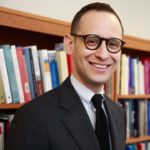The New Whiggery Fellowship
September – December 2023
The New Whiggery Fellowship offers a guided study of the core ideas of the classical liberal tradition—a tradition at the heart of the American Founding. The classical liberal tradition orients around the presumption that each person ought to be permitted to pursue his or her interests, in his or her own way, within the rules of justice. That presumption emerged largely out of a Christian worldview emphasizing the fixedness and fallenness of human nature and the dignity of the individual. The classical liberal tradition advances the proposition that a system of political, economic, and religious freedom within the rule of law is the social order that best promotes the common good of humankind.
Classical liberalism drew from many streams. But it came forth principally in seventeenth- and eighteenth-century Anglo-American discourse. The fellowship program will delve in key primary sources from this discourse, with readings in political philosophy from figures such as John Locke, David Hume, Baron de Montesquieu, Edmund Burke, James Wilson, and James Madison, and Benjamin Constant; in political economy from Francis Hutcheson, Adam Smith, Josiah Tucker, and Frédéric Bastiat; and in moral and political theology from John Calvin, Richard Steele, Richard Baxter, Joseph Butler, and Jonathan Edwards. These key sources will be complemented by selections from twentieth-century defenders of variants of classical liberalism including F. A. Hayek, Wilhelm Röpke, Milton Friedman, and Michael Novak.
The central themes to be explored in the fellowship are: property, justice, and the rule of law; economic freedom; religious freedom and toleration; the dignity of work and the pursuit of honest income; and the relationship between classical liberal philosophy and Christianity.
The New Whiggery Fellowship will meet at least three times monthly on Wednesday nights, starting on September 13 and ending on December 13. Dinner will be available prior to the seminar meetings at 6:00 PM, and the meetings will run from 6:30 PM to 8:00 PM in the IRD office at McPherson Square (1023 15th St NW, Suite #200, Washington, DC 20005). The Fellowship will additionally feature several field trips and an off-site retreat.
The Fellowship will be led by Erik Matson, Senior Research Fellow at the Mercatus Center, Deputy Director of the Adam Smith Program in the Department of Economics at George Mason University, and a Lecturer at the Busch School of Business at the Catholic University of America. He will be joined monthly by Sam Goldman, Associate Professor of Political Science at George Washington University, Executive Director of the John L. Loeb, Jr. Institute for Religious Freedom, and Director of the Politics and Values Program. Goldman, additionally, is the author of God’s Country: Christian Zionism in America (2018), and After Nationalism (2021). There will be other guest speakers, as well as field trips and an off-site retreat.


Participants are expected to complete assigned readings and physically attend sessions. As such, candidates must be in the DC area for the duration of the fellowship.
To apply for the fellowship, candidates can submit the following materials to sstewart@theird.org:
Resume (as an attached Word Document or PDF).
Writing Sample (as an attached Word Document or PDF). In their writing sample, candidates should answer the following prompt in less than 500 words: “What are the benefits of a political system of ordered liberty?”
Two References.
All materials must be emailed to sstewart@theird.org by September 6, 2023.
The New Whiggery Principles
The New Whiggery (TNW) promotes the best of the Anglo-American tradition of ordered liberty, limited government, rule of law, free speech, respect for minority opinions, religious liberty, social harmony, reform, historical patience, multigenerational institution building, and optimism about the future, rooted ultimately in biblical anthropology and natural law. Whiggery emerged from Dutch-Anglo-American Protestantism but its principles are for all people who want order, liberty and justice. Special landmarks for TNW include the Glorious Revolution of 1688 resulting in Britain’s Bill of Rights and Toleration Act, the Declaration of Independence of 1776, the U.S. Constitution of 1789, and the Gettysburg Address of 1863.
This legacy of liberty originated in a particular historical context, especially in Dutch, British and American cultures of the 1600s and 1700s, but it points to universal principles rooted in the divine order. Some contemporary critics deride this legacy of liberty as secular, materialistic, individualistic, even hedonistic. But the Anglo-American political tradition originated with a profoundly biblical understanding of society’s duty to respect each person’s right to live, think and speak without coercion, above all the ability to worship God freely. Each person equally bears God’s image and merits respect. Other critics deride our legacy of liberty as oppressive, racist, patriarchal and imperialistic. They ignore that humanity is fallen, but that our Whiggish tradition has redemptively pointed to the dignity and equality of all persons, with transformative progress across centuries. Whiggery is providential. Humanity is sinful but God is kind and merciful. Whiggery rejects despair and utopianism. TNW esteems:
- Constitutional self-government, rule of law, and legal equality for all.
- Respect for minority rights and the protection of dissenting views.
- An open public square, civil democratic discourse, and open market of ideas.
- An appreciation for political balance and moderation.
- A commitment to justice, social improvement, and reform that stresses the role of institutions, voluntary associations, and personal duty.
- The compatibility of a market economy, dignified work, and a widespread regard for the common welfare.
- Decentralized power with an executive enabled to act decisively during national peril.
- A foreign policy of international order and openness, respect for legitimate national sovereignty, human rights, economic development, and anti-aggression.
- A role for faith and conscience in public life.
These ideas emerged in a particular historical context but are not the exclusive inheritance of any nation or culture. Whiggery’s realistic appraisal of human nature and distrust of arbitrary power is relevant for and conducive to human prosperity in all cultures. Anyone advocating for ordered liberty and against arbitrary power is Whiggish, whether in Hong Kong, or Ukraine, or Venezuela. Tyrants and materialists claim history favors them. Whigs know that Providence can seem slow but moves inexorably towards justice and freedom. Whiggery is historically patient but also is fiercely jealous for the rights and dignity of all people.
Whiggery believes in tradition and progress. To appreciate our history is not to obscure injustices or romanticize the past. Reformers fail if viewing the past as only shackles from which to be freed. TNW aims to commune with those who came before, admitting the bad, celebrating the good, reinvigorating our society today by perpetuating first principles for posterity.
TNW is a community of sensibility and an aesthetic. We cheerfully invite all to join us in aligning with a kind Providence in working for a better world of human dignity, freedom and justice.
If you are interested in learning more about the principles of The New Whiggery, read the following documents:
- The New Whiggery – article by Mark Tooley
- Thomas Aquinas, the First Whig – article by Michael Novak
- Why I am Not a Conservative – excerpt from F. A. Hayek’s book of the same name
The New Whiggery hosts monthly lectures (with dinner) at The Institute on Religion and Democracy office. If you are interested in potentially attending these invite-only lectures, please contact Sarah Stewart at sstewart@theird.org for more information.